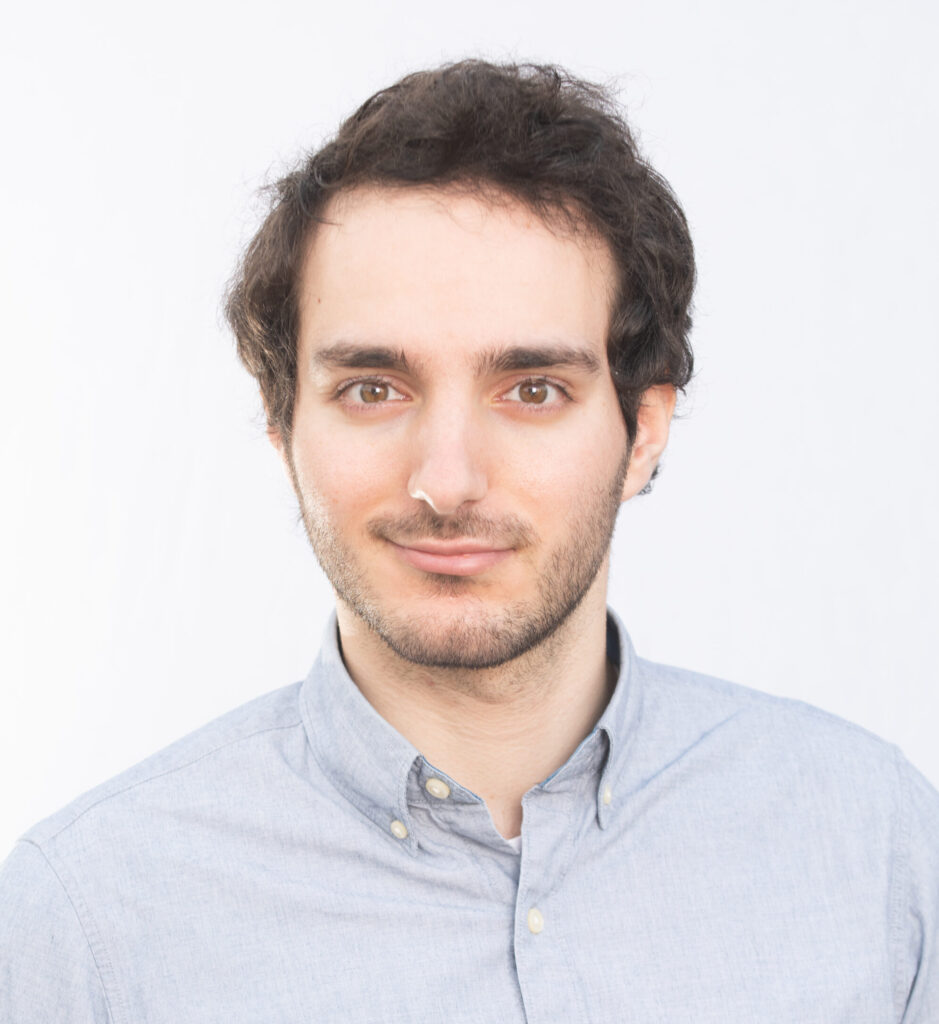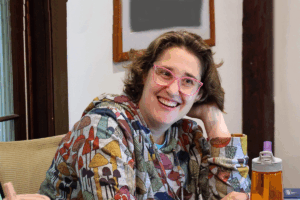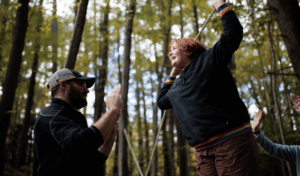Can anxiety serve as a compass? If you’ve had the Mountain Valley experience, it can. John Wyetzner, LCSW, felt paralyzed by anxious thoughts, but his short time at MV was transformative. Today he’s accumulating expertise as a therapist specializing in OCD treatment, engaged to be married, and using fear as a motivator to make—not avoid—decisions.

Tell us about your background and how you came to Mountain Valley?
I grew up in Manhattan in New York City. I had anxiety from an early age, just in general. But as I got older it steadily got worse, never to the point where I couldn’t function, but just a constant part of my life. Eventually I couldn’t go to school. I woke up one morning and it felt too hard to do. That happened for almost a month, waking up, feeling super anxious, and not being able to attend school. I felt depressed and I didn’t know why I couldn’t push through it. It became a cycle—it went on for so long that it felt like it would be super weird for me to return, and it just compounded.
I had been in therapy, mostly talk with some CBT and ERP, but nothing super intense. At that point, it was clearly not enough, and I needed a higher level of care. It was 2012 and my parents found Mountain Valley, which was still a new program. It took a lot of convincing for me to go, because I didn’t think it would help. Eventually I realized I had nothing else going on and I should give it a try.
I remember the night we drove up, and I was terrified. But the next day I looked around, and it felt welcoming and warm, which was a new experience for me. I decided to try it out. It was my first time being around other people who had anxiety and felt comfortable talking about it. It was very reassuring to me to not have to hide it.
What was your biggest fear and how did you work through it?
I really worried about being anxious in front of others in public and not feeling like I had a safe place to retreat. My anxiety was often somatic, and it would show up as nausea. I would throw up sometimes and that made me feel very anxious. A lot of my exposure work centered around having a stomachache and what it would feel like to throw up. We also did a lot of social exposures, which included talking to new people and strangers.
Once I was there, I felt super motivated to put in the work. I turned the corner because I was around people who made me feel comfortable with vulnerability. I spent most of my time with eight other residents, which was certainly a big change from the city but also comforting. It was also helpful for me to get outside and get fresh air, even though I attended during the winter, it was good to just walk around campus to the different buildings.
What did life look like after Mountain Valley?
The plan was for me to return home and go back to school, but we decided that therapeutic boarding school would be a better fit. I managed my anxiety and was able to go to college after that. Since mental health had been such a big part of my life, I decided to major in social work. College went well and I didn’t have any big concerns, which was a nice change. After college, I went on to graduate school and got my MSW so I could work as a therapist.
How did you end up in your current practice setting?
Based on my own experience, I knew I wanted to specialize in OCD work. After a few years I got my higher-level license, and I wanted to move back to the city. I found the Child Mind Institute, and it was a perfect fit. We do a lot of outpatient sessions, parent work, and collaborating with other clinicians and schools. We also run an OCD intensive program.
I think I understand the issues well because I’ve been through them myself. It helps me understand my clients’ mindset and connect with them. If sharing my story feels appropriate, I’m happy to do that and talk about how I went through a similar journey but came out on the other side.
I think our exposure work is powerful because OCD is the disease of doubt. You get so stuck in your head problem solving that you’re on a mental treadmill. Exposure gets you out of that headspace by challenging you to test your thoughts. Once you do that, you see that what you thought would happen is often wrong and that OCD is lying to you.
Tell us about a success story you’ve had with a client?
One of my clients had OCD centered on perfectionism, especially getting good grades. She had a hard time turning in work if it wasn’t perfect, and she would catastrophize. We spent a lot of time talking about her feared outcomes and how they felt bad, but we didn’t know that they would happen for sure. And if they did happen, maybe they wouldn’t be as bad as she thought. For an exposure I gave her a short, timed writing assignment. She didn’t like doing it, but it was helpful. She saw that she could make a mistake and that it was still okay—she didn’t have to listen to that part of her brain.
How has your life changed since you attended Mountain Valley?
My time at MV heavily influenced who I am today. In my career, I want to continue helping clients and the public better understand OCD. The media and society tend to misrepresent it as simply a hyperfocus on cleanliness or symmetry. It’s so much more complicated than that, so let’s normalize the other ways it presents.
I got engaged recently which has been great, I’m starting to think about our future together. It’s exciting and nerve-wracking. But I’m so much better equipped to deal with my anxiety today. When I notice I feel anxious about something, like attending a party, that feeling tells me I should do it and that it will be a good exposure for me. It’s a good compass for me, even though I don’t always enjoy pushing through. But 95% of the time, it turns out better than I expected. Once I show up that anxiety almost always goes away.


